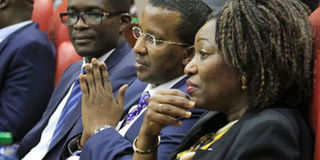Kenyans in the diaspora have right to vote

From left: Independent Electoral and Boundaries Commission Chief Executive Officer Ezra Chiloba, Chairman Issack Hassan and Vice-Chairperson Lilian Mahiri-Zaja before a joint parliamentary select committee on the body at Parliament Buildings on August 2, 2016. PHOTO | JEFF ANGOTE | NATION MEDIA GROUP
What you need to know:
- The Kenyan diaspora, however, would not ideally be considered a marginalised community because it is economically powerful, sending home more than Sh120 billion in remittances annually.
- Kenyans seeking higher education, especially in the United States, and who had settled there with their families began to understand that they were here for the long-haul and they needed to secure a structured belonging as transnational citizens.
- One of the solutions to resolving the political inclusion stalemate against these voters is for the Ministry of Foreign Affairs and the IEBC to recognise the diaspora’s solutions such as i-Vote.Net and create partnerships.
The path to Kenya’s nationhood has been ridden with the marginalisation of communities that now include the Kenyan diaspora. Marginalisation does not only affect communities under economic distress, but also those whose political rights have been suppressed.
For a long time, geographical marginalisation was reserved for those in remote northern Kenya. The Kenyan diaspora, however, would not ideally be considered a marginalised community because it is economically powerful, sending home more than Sh120 billion in remittances annually. In reality, the diaspora is a forgotten population by the fact that it is a politically disenfranchised constituency, having been denied the right to vote, as enshrined in the Constitution.
Political exclusion, like any form of marginalisation, implies the suppression of rights. The Kenya diaspora has an active history of struggle for inclusion dating back to the turn of the millennium. It started with the push for dual citizenship.
Kenyans seeking higher education, especially in the United States, and who had settled there with their families began to understand that they were here for the long-haul and they needed to secure a structured belonging as transnational citizens.
They learned from diasporas who had settled in the US for decades that no matter how long they stayed away from home, they still pledged allegiance to their home country.
Jewish, Irish, Filipino, and other diasporas in the US have become powerful contributors to their home countries’ political and economic wellbeing while still maintaining active participation as citizens of the United States.
The Kenyan Community Abroad sent delegates to the Bomas constitutional reform process that eventually led to the inclusion of dual citizenship in the 2010 Constitution. On a visit to the US, former president Mwai Kibaki once dismissed dual citizenship as a pipe dream, a silly notion that one should have one foot in one country and the other in another. The concept of transnational citizens, as advocated by diaspora Kenyans, was alien to many.
The Kenyan diaspora has actively been involved in numerous relief efforts whenever there was a disaster in Kenya — from the 1998 terrorist attack to famine relief and scholarship funds — efforts that speak of connectedness with home despite distance.
The diaspora community is growing and the government must address the issue of political exclusion. Opportunities to make this viable between the government and the diaspora are there. Through the Kenya Diaspora Alliance, these Kenyans have pushed for the acknowledgement of the diaspora vote through court processes and have secured the right to registration and voting mechanisms.
Voting is the most powerful of political rights, giving every individual citizen an equal voice regardless of ethnicity, religion, gender, or wealth.
The Independent Electoral and Boundaries Commission (IEBC) must work with the diaspora to enable it to vote in 2017. One of the excuses the IEBC has repeatedly used is that it does not have reliable statistics of Kenyans in the diaspora. The diaspora has, since 2012, presented to the IEBC, select ambassadors, and the public a feasible platform that maps out the statistics of diaspora Kenyans globally — the i-Vote.Net.
One of the solutions to resolving the political inclusion stalemate against these voters is for the Ministry of Foreign Affairs and the IEBC to recognise the diaspora’s solutions such as i-Vote.Net and create partnerships.
Diaspora voter inclusion is an imperative that would strengthen the sense of nationhood and attract investment from an endowed constituency that is seeking to play a role in nation-building.
The writer is a trustee of the Kenyan Community Abroad. [email protected]





